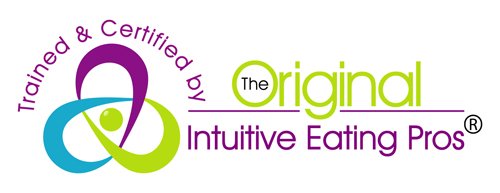Intuitive Eating Counseling
What is intuitive eating?
“Intuitive Eating is a self-care eating framework, which integrates instinct, emotion, and rational thought.” - Evelyn Trioble.
Intuitive eating is an evidence-based process that is based on 10 principles:
1) Reject the diet mentality: Recognize and reject the lies that diet culture has told you. Throw out your diet books and magazines, and reject the loud, conflicting voices telling what and how to eat. Learn the truth about why diets fail (rather than you failing the diet!) and how dieting ultimately harms your health and well-being.
2) Honor your hunger: Tune into your body’s cues, and keep yourself fed with adequate calories and carbohydrates. When you allow yourself to go hungry, a primal drive to overeat is triggered. Learning to honor your hunger, rather than feel afraid of your hunger, begins to help you learn to trust your body’s signals.
3) Make peace with food: Give yourself unconditional permission to eat. When you restrict (or try to restrict) certain types of food or entire food groups, you set yourself up to feel biologically or psychologically deprived, which will ultimately lead to uncontrollable cravings and binges.
4) Challenge the food police: Learn to reject the critical thoughts in your head that judge you by how “well” you eat and ascribe moral value to you based on your diet.
5) Respect your fullness: Pay attention to your body's cues that you are no longer hungry. Learn the signs that tell you when you are comfortably full, pausing during a meal to ask yourself how your food tastes, and check in with your fullness level.
6) Discover the satisfaction factor: Re-learn the pleasure of eating foods that delight, comfort, and satisfy you. Eat food that tastes delicious, smells amazing, looks appetizing, and enjoy it in an environment that is relaxed and inviting. Eat in a slow, mindful way and learn to savor your food again.
7) Honor your feelings without using food: While eating for comfort can be nourishing and healing, we also need ways of honoring our feelings apart from food. Find ways to connect with yourself and with loved ones that nurture and heal you.
8) Respect your body: Learn the truth about size diversity, and accept your genetic makeup. The human race was never meant to be homogenous in size, though diet culture likes to tell us that there is one “right" way to look and feel “healthy.” Reject those lies while learning to respect and accept your body exactly as it is.
9) Exercise - feel the difference: Stop using exercise as a way to punish yourself, to “make up for” things you ate, or a way to “earn" your food. Find the ways of moving your body that bring you joy and make you feel good.
10) Honor your health with gentle nutrition: Make food choices that help you to feel well and that honor your health, while keeping a flexible mindset. Know food choices do not determine your overall health, while noticing what food choices do help you to feel the way you want to feel.
Is intuitive eating counseling for me?
Intuitive eating counseling is for individuals who are ready to stop the cycle of compulsive and yo-yo dieting, calorie counting and disordered eating. It is for individuals who want to make peace with food and their body.
Unlike a diet or weight-loss plan, intuitive eating helps you to become the expert of your own body and your own needs. If you’ve found yourself thinking life is going to be so much be better when I lose X amount of weight (over and over again), you’re a failure for “blowing it” again on your diet or your worth is dictated by what the number on the scale says or what you ate that day, intuitive eating counseling will likely be helpful for you.
While intuitive eating counseling can encompass some components of psychotherapy, it is primarily an action-based process that helps individuals learn skills to understand their body’s needs and how to meet those needs. Intuitive eating counseling is a service clients may choose to utilize on its own or in conjunction with psychotherapy services.
What is the intuitive eating counseling process?
Through intuitive eating counseling, we will work together to help you learn:
How to identify your hunger and fullness cues.
How to trust your body and what it is telling you it needs.
How to change beliefs that support compulsive dieting and a disordered relationship with food and your body.
How to identify the needs that are driving compulsive behaviors with food and/or exercise and how to meet these needs in ways that are more supportive of yourself and kinder to your body.
The role that emotional eating has played in your life and how to get your needs met without using food as a tool to try to meet these needs.
How to increase self-esteem and self-confidence around your ability to become the expert of your own body.
